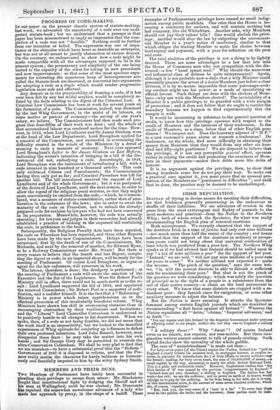PROGRESS OF CODE-MAKING.
IN our paper on the present chaotic system of statute-making, last week, we advocated the superiority of a code over our undi- gested statute-book ; but we understand that a passage in that paper has been misconstrued to imply an impression that the com- pletion of a code was not " feasible. ' Nothing could be further from our intention or belief. The expression was one of impa- tience at the obstacles which have beset so desirable an enterprise, but was not at all meant to justify obstruction or excuse despair. On the contrary, we endeavoured to show how a code might be made compatible with all the advantages supposed to lie in the present system; the permanency and simplicity of the one being united to the capacity of the other for taking in new precedents and new improvements : so that some of the most specious argu- ments for tolerating the monstrous heap of heterogeneous acts called the Statute-book are disarmed, or converted into arguments for adopting a code as a staple which would render progressive legislation more safe and effectual. Any despair as to the practicability of framing a code, if it has ever been felt by any but wilful sceptics, would be completely re- futed by the facts relating to the digest of the Criminal Law. A Criminal Law Commission has been at work for several years on the formation of a code. The Commission indeed, was dismissed by the last Whig Government, in the midst of its labours, on some motive or pretext of economy—the saving of one year's salary, we believe. The Commissioners had then made such pro- gress that four-fifths of their work was done ; and the whole of that accumulated labour was rendered useless for the time. How- ever, in 1842, when Lord Lyndhurst and Sir James Graham were at the bead of the Law Department, Lord Brougham applied for a renewal of the Commission, and succeeded in overcoming the difficulty created in the minds of the Ministers by a dread of seeming to undo a measure of economy. Next year appeared Lord Brougham's Letter to Sir James Graham on Lam Reform, indicating the writer's intention of bringing in a bill if the Go- vernment did not, embodying a code. Accordingly, in 1844, Lord Brougham was the instrument of introducing a bill, with a code annexed in nine hundred or a thousand articles. This code only embraced Crimes and Punishments ; the Commissioners having then only got so far' and Criminal Procedure was left for another bill. The bill introduced received the support of Lord Lyndhurst and of the whole Government ; but it was postponed, at the desire of Lord Lyndhurst, until the next session, in order to allow the repeal of the religious penal statutes, so that they might more conveniently be omitted from the code,—which, be it remem- bered, was a measure of statute-consolidation, rather than of ame- lioration in the substance of the laws ; also in order to await the maturity of the code on Procedure, and to submit the already- prepared code for revision by lawyers who had not been concerned in its preparation. Meanwhile, however, the code was actually operating ; for lawyers and judges in their researches had already established a practice of looking to the unpassed bill containing the code, in preference to the books. Subsequently, the Religious Penalty Acts have been repealed, the code on Procedure has been reported, and three other Reports have been made by the new Commissioners. Delays have been occasioned, first by the death of one of the Commissioners, Mr. Richards, and next by the removal of another, Sir Edward Ryan, to be a Railway Commissioner under Mr. Strutt I But there is every reason to believe that the fourth and last Report, comple- ting the digest or code, in an improved shape, will be ready for the meeting of Parliament. Of course Lord Brougham, as organ or agent for the law-reformers, will persevere in his work. The labour, therefore, is done the drudgery is performed ; at the meeting of Parliament a code will await the sanction of the Executive and the fiat of the Legislature. Were Sir Robert Peel's Ministry still in office, there could not be much doubt as to the re- suit: Lord Lyndhurst supported the bill of 1844, and appointed the renewed Commission ; Sir Robert Peel is a supporter of codi- fication, and a codifler himself. It is the fact that a " Reforming" Ministry is in power which raises apprehensions as to the effectual promotion of this incalculably beneficial reform. Whig Ministers have shown less skill in overcoming obstacles than in encouraging obstruction by their vacillations and hesitations; and the 'Liberal" Lord Chancellor Cottenhain is understood to be positively hostile to all changes in his department. When we spoke, then, of a code as not being feasible' we did not mean that the work itself is an impossibility, but we looked to the manifold experiences of Whig aptitude for conjuring up influences to defeat their own professed intentions. Lord John Russell, however, may disappoint these fears : he may take the matter into his own hands ; and Sir George Grey may be permitted to overrule the ultra-Conservative Cottenham. We shall be very glad to find that we are mistaken—to have a substantial proof that the " Reform " Government of 1847-8 is disposed to reform' and that the Pre- mier really merits the character for hardy boldness so humour- ously and fancifully imputed to him by the witty Sydney Smith.


























 Previous page
Previous page